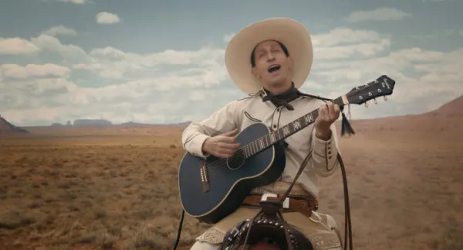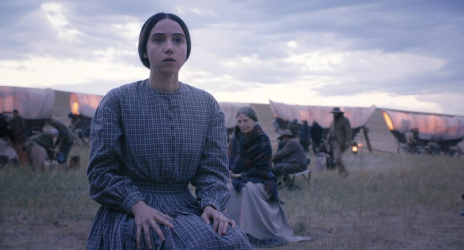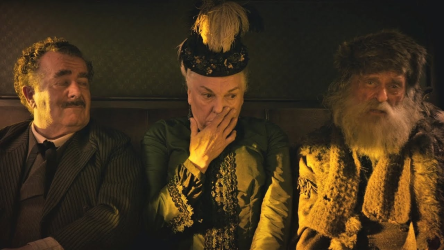The new office puts The Boy and I within striking distance of some of the usually hard-to-get-to theaters, and this created the felicitous circumstance where we actually able to see the Coen brothers’ new movie on the Big Screen, instead of just on Netflix. As a rule-of-thumb, I don’t watch movies on TV, but as another rule of thumb, I see all the Coen brothers’ movies. The former was winning over the latter until this fortuitous day.
There’s another rule of thumb: Anthology movies suck. This is in conflict with yet a fourth rule of thumb (I’m all thumbs!), to wit: Coen brothers’ movies are great.

Tim Blake Nelson does not have a stunt yodeler this time.
The greatest anthology movie I’ve ever seen was 2014’s Argentine/Spanish movie Wild Tales. I may have even remarked at the time that it was the only good anthology I’d ever seen, but that’s a bit less defensible. Nonetheless, it is typically the case of anthology films that there is one good, well-developed story—often the longest story—that is not quite long enough to be a feature, and which is then padded out with some lesser stuff, sometimes things that don’t rise much about a shaggy dog story.
Now, we really liked this movie, but I feel like a lot of people are going to have the aforementioned reaction to it: Some of the stories are very good, and some are weaker. But I also feel like there won’t be broad agreement as to which is which.
Of the six stories here, we have the full range of Coen: The opening story is a broadly comic mashup with Tim Blake Nelson as a singing cowboy—who’s also a cold-blooded gunslinger. (Think Raising Arizona.) The second story is darkly comic features James Franco as a bank robber who escapes the noose only to find himself in even deeper (?) water. (I’d say A Serious Man, though with more insouciance.)

Have some dignity, man!
The third story has Liam Neeson as an impresario to an armless/legless actor (Dudley from Harry Potter!) who turns out record crowds as they travel around the West…at least for a while. (This feels sorta Miller’s Crossing.) The fourth story has Tom Waits as a prospector who finds a big vein of gold in a beautiful but isolated land. If I had to relate it, tone-wise, it might best fit No Country For Old Men, though it’s not as bleak.
The fifth story takes place on the Oregon Trail, and is a tale of hardship and romance, reminiscent of True Grit (down to the characters’ refusal to use contractions in their speech). The last story is basically a ghost story which probably calls Blood Simple to mind as much as anything.
So, you know, if you like their funny movies, the first two stories, and maybe the last are going to be more to your liking than the middle ones. I might say I liked “The Gal Who Got Rattled” (the Oregon Trail one) the most, because it’s a funny sort of love story that really throws into contrast life then versus life now. But it’s really hard to compare them one to the next because they are very different (apart from their innate Coen-ness).

Zoe Kazan gets rattled.
We found the Liam Neeson one (“Meal Ticket”) the least interesting, perhaps because it played out exactly as we expected it to. The Tom Waits shouldn’t have been as interesting as it was, given that it’s mostly just one guy occasionally talking to himself.
The last one is odd-in-that-Coen-way because it’s not really a ghost story, or not exactly a ghost story. It’s much like the Dybbuk story at the front of “A Serious Man” and Brendan Gleeson (Calvary, The Guard) and Jonjo O’Neill (Defiance) as the Irishman and the Englishman, respectively, spell out the Coen philosophy.
Nobody knows anything. (Pace Eddie Mannix.) If you think you know what’s going on, wait five minutes, and the tide will turn. The best we can hope for, perhaps, is moments of clarity where we briefly get a glimpse of the machinations of fate. Or, even if we don’t understand those machinations, we may be favored by them.

Last time I remember seeing Tom Waits in a film, it was Bram Stoker’s Dracula.
In this last story, the Irishman and the Englishman are bounty hunters on board a stagecoach with three other passengers. The stagecoach never stops till it reaches its destination. The five argue increasingly metaphysical points, with the Englishman saying:
Englishman: I must say, it’s always interesting watching them after Clarence has worked his art. Watching them negotiate the passage.
Frenchman: Passage?
Englishman: From here to there. To the other side. Watching them try to make sense of it, as they pass to that other place. I do like looking into their eyes as they try to make sense of it. I do. I do.
Trapper: Try to make sense of what?
Englishman: All of it.
Lady: And do they ever succeed?
Englishman: [smiles] How would I know? I’m only watching!
And at the end, the reluctance of the three other passengers to follow the Englishman and the Irishman into the spooky hotel suggests that they’re all dead. But if they’re all dead, what was the corpse that the two bounty hunters took into the hotel? It doesn’t work!

But then, I don’t think it’s supposed to. They just like looking into our eyes as we try to make sense of it. They do. They do.
I, for one, was not fooled. In particular, I was not fooled by the central conceit that The Ballad of Buster Scruggs was a real-live book with color plates and published long ago. These are original Coen stories, except for “All Gold Canyon” which is a Jack London story, and “The Gal Who Got Rattled”, which was “inspired by” a story by Stewart Edward White.
Great performances. I thought Jonjo O’Neill gave the best performance I ever saw out of Paul Rudd. (I kept looking at him thinking, “Is that Paul Rudd? He’s doing great here!”) Harry Melling does an amazing job without arms and legs. Zoe Kazan (the gal who ends up quite rattled indeed) manages to be appealing in a movie designed to make nobody look very good. (The Old West was dirty.)
Carter Burwell’s score, six of them really, each as different from the others as the stories themselves, is spot on. His score for “The Gal” feels very Randy Newman-esque, though perhaps more owing to the Newmeister’s love of old-style orchestration and folksy melodies.
We could see it again. If it comes out closer to home, we’ll take The Flower, in fact. It won’t change anyone’s minds about the Coen brothers, though.

The Frenchman, the Lady and the Trapper on their way to…?
